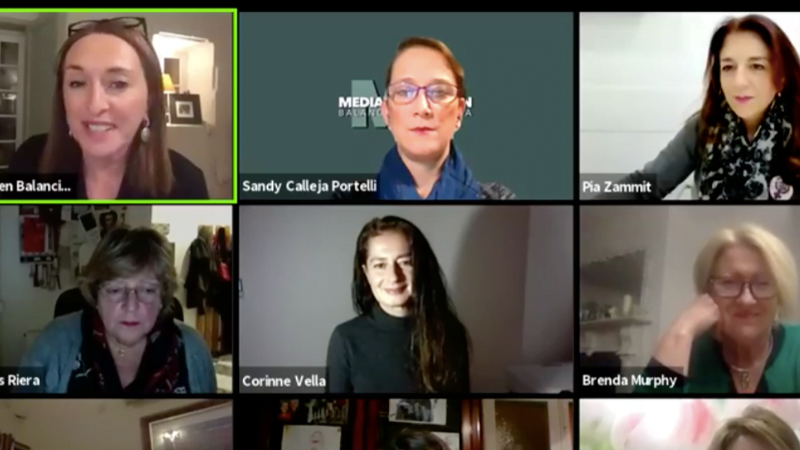Verbal abuse against women journalists has become legitimised through years of dehumanisation against assassinated journalist Daphne Caruana Galizia, her sister Corinne Vella said in a webinar discussing the challenges faced by women journalists in Malta’s media landscape.
Vella said Daphne, had faced years of hate campaigns because she had shocked the system. “It started with hate mail and offensive phone calls. Then the internet came about and it became louder and more amplified. There was a full on campaign to dehumanise her. It was the government against a lone journalist”.
The panellists who participated in the debate organised by Mediating Women called ‘Under Attack: Women Journalists and the Gender based Risks that Come with the Job’, agreed that women journalists in Malta have to go against a current of partisan politics, misogyny and boundaries set by society.
The attacks and harassment of women journalists have not stopped and even continued after Daphne’s death. “This is how dangerous it has become. The attacks have never stopped and this behaviour has been legitimised,” Vella said.
The online event held made reference to an investigation by The Shift which looked into partisan social media groups and how they carried a coordinated narrative against Caruana Galizia.
Addressing the webinar, founder and editor of The Shift, Caroline Muscat said the six-month investigation exposed far more than expected. “What we observed was a coordinated, consistent and planned campaign to portray one single individual as a ‘witch’, an ‘evil’ person. Even in the aftermath of her death, people in these groups celebrated the assassination and they used the same labels attributed to her in the 30-year campaign of dehumanisation,” Muscat said.
Brenda Murphy, the founder of NGO Mediating Women, explained that the organisation was set up to address the lack of real change in the last years: “Our aim is to look at harassment across the local media landscape. To do so, we required a media-oriented NGO.”
Times of Malta columnist Kristina Chetcuti said that because of intensified harassment following Daphne’s murder, she had decided to quit Facebook. “Everything changed after Caruana Galizia’s assassination. Even my writing,” she said.
She described how online had escalated. “First they rubbish your credibility, then they call you stupid and then they move on to bullying you. Eventually, they offend and threaten you. This was all coming from an army commissioned by Castille to attack us.”
Teresa Carreras Riera from GAMAG Europe saluted Caruana Galizia for her journalistic work and her family who continue to fight for justice. “When justice is slow, justice is not achieved. In Malta, it is taking too long for the local justice system to punish the perpetrators involved in the murder of Caruana Galizia.”
At the conclusion of the event, Caroline Muscat called on those who have the ability to to make their voice heard to unite behind a single message, to break the boundaries imposed in terms of gender and politics.
Corinne Vella added that despite each individual efforts, for real change to happen, the country’s institutions must be functioning properly. “Daphne would not have been murdered if the institutions functioned properly. Her sons had told Europe that it needs to do something otherwise this will happen again. And months later, journalist Jan Kuciak and his girlfriend were murdered outside their home in Slovakia. Journalists are at risk, and we need to understand that.”












